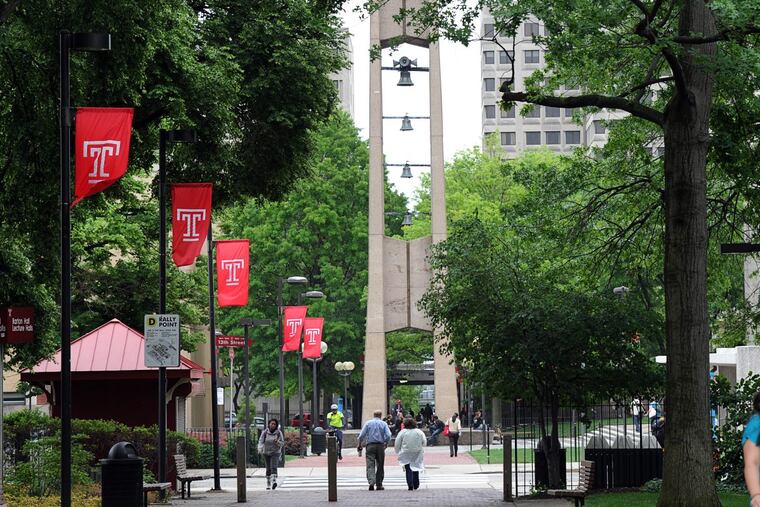Addiction counselors want colleges and others to do more in fighting opioid crisis
From the boards of directors down to students struggling to navigate a complicated new world where drugs and alcohol are ubiquitous, we need to find multiple ways to support those who use substances and those who enter recovery.

The drug overdose deaths of Michael Paytas and James Orlando, both in one week at Temple University, strike painfully at home. We are addiction professionals who face the loss of our friends, clients, and loved ones on a daily basis.
We should not be surprised that the opioid epidemic has reached our local universities. According to the Drug Enforcement Agency, the drug-related overdose death rate in Pennsylvania in 2016 was 36.5 per 100,000. There are more than 70 institutions of higher education in our region with well over 100,000 students, so it is likely that there are many more overdoses that never make the front pages. We know of many, so many more than in previous years, and the stories of Temple students and the many like them should remind us that addiction does not discriminate.
As parents we send our kids off to college thinking the school will provide for the health and safety needs of our children, but local universities appear to be failing at that task. Temple's Tuttleman Counseling Services provides excellent services to students with substance use disorders. They had psychiatrists prescribe Suboxone and treat opioid use disorder long before any psychiatrists were doing that at college counseling centers. They have offered drug and alcohol groups, student 12-step meetings, and evidence-based individual therapy for students from either abstinence or harm-reduction perspectives.
Most universities aren't willing to assume that responsibility. Temple at least, tries valiantly and deserves kudos for it. But the grim reality is that overdoses will continue to happen. Substance-abuse disorders can make any university, treatment professional, or family member look really, really bad. Our local universities must drastically rearrange their priorities if we do not want to read more horrific stories.
From the boards of directors down to students struggling to navigate a complicated new world where drugs and alcohol are ubiquitous, we need to find multiple ways to support students who use substances and those who enter recovery. Universities must continue to train faculty and staff to recognize the signs of substance-use disorders and mental-health conditions and continue to research and implement effective processes to engage students in these services.
We must lift up and support our students with collegiate recovery programs. Students at Drexel, Penn, St. Joseph's, and West Chester have been advocating for these services but felt stymied by bureaucracy and a lack of fiscal support. Our hope is that recent tragedies will serve as a wake up call that we must better support students who wish to get well.
We must ensure students know we have world-class addiction research centers in Philadelphia, and excellent inpatient and intensive outpatient drug and alcohol treatment. We have state-of-the-art college counseling centers and numerous mental-health professionals. Philadelphia is a hot bed for mutual support meetings such as Alcoholics Anonymous (AA) and other 12-step fellowships. We have private practice addiction psychologists, drug and alcohol therapy groups, Mindfulness Based Relapse Prevention groups, and more.
We must also rethink our perspective of whose job it is to make changes at the macro and micro level. Universities need to refrain from punitive responses to drug and alcohol use and instead increase promotion of prevention, wellness, outreach, counseling services, medication assisted therapies, and harm reduction. We must call our alma maters and our children's schools and demand to know if they properly equip and train staff in response to the opioid epidemic.
At the individual level, we must encourage students to talk to each other about the role that drugs and alcohol play in their lives. Ask them to ask others if they have ever gotten help. Do they need someone to talk to now? Can you help them find someone to talk to about the use of drugs or alcohol? We must do the same with our own peers and family ourselves. Talk about your own struggles with mental health or recovery. Let people know recovery works. Allow yourself to be vulnerable, show by example. Offer to go to a counselor or to a meeting with someone you care about.
Ultimately we must all acknowledge the humanity of people who use drugs. They deserve compassion too. No student, no person, has to suffer this fate.
Jeremy Frank is an addiction psychologist practicing in Philadelphia at Jeremy Frank and Associates and the former coordinator of campus alcohol and substance awareness at Temple University. jfrankphd@gmail.com
Devin Reaves is a national speaker on addiction and executive director at Life of Purpose New Jersey, a treatment program for college students. Devin.reaves@gmail.com